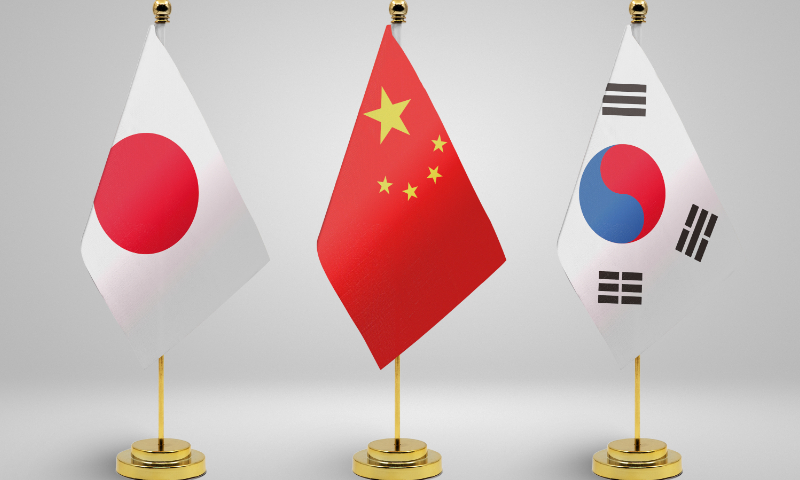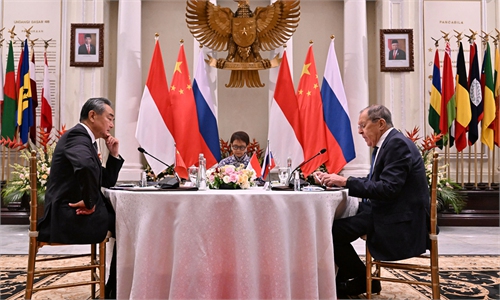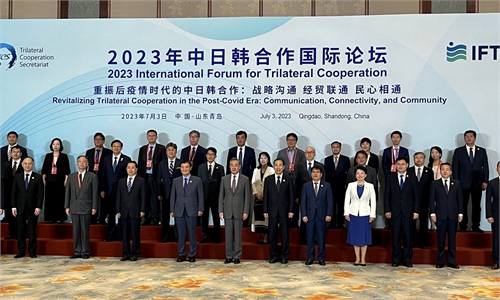
Flags of China, Japan and South Korea
The Central Bank Governors' Meeting of China, Japan and South Korea was held on Sunday in Japan with candid exchange of views on regional economic and financial developments. Experts said that the meeting is important in judging the global economic situation and stabilizing the financial markets in East Asia.The Twelfth Tripartite Governors' Meeting was presided over by Bank of Korea (BOK) Governor Rhee Chang-yong, joined by Party chief of the People's Bank of China (PBC) Pan Gongsheng and Bank of Japan (BOJ) Governor Kazuo Ueda. The three governors exchanged views on the recent economic and financial situation, read a statement on the website of the PBC.
The Thirteenth Tripartite Governors' Meeting will be hosted by the PBC in 2024.
The first such meeting was held in Shenzhen, South China's Guangdong Province on July 23, 2009, in the wake of the 2008 financial crisis.
Fifteen years later, the global economic situation is more complex than ever, and the three countries are facing more challenging headwinds, He Weiwen, an executive council member of the China Society for World Trade Organization Studies, told the Global Times on Sunday.
"The meeting has an important purpose to help the three countries better study and judge the global financial situation, to enhance cooperation and stabilize the financial markets in East Asia," said He.
Amid a weak global economy, many countries have raised interest rates to tackle inflation, which has also affected Japan and South Korea, Dong Shaopeng, a senior research fellow at the Chongyang Institute for Financial Studies at the Renmin University of China, told the Global Times on Sunday.
The BOK said in a report on July 13 that there remains a high degree of uncertainty regarding the future path of inflation, including global oil and food price movements.
"It is forecast that consumer price inflation may keep edging down, but it could pick up after August and fluctuate at around 3 percent through the end of the year," read the report.
Data from South Korea's purchasing managers showed that its manufacturing activity has been declining for the past year.
Japan is facing rising inflation too. The BOJ struggled to achieve 2-percent price stability target despite massive monetary easing. The situation drastically changed from 2022 as inflation surpassed the 2-percent mark, remaining at 3 percent or higher now.
"Deepening cooperation among China, Japan and South Korea in the financial sector will stabilize levels of interest and exchange rates, as well as regional economy," said Dong, noting that the trilateral financial cooperation could expand to establishing free trade zones.
The meeting could accelerate coordination in setting their interest and currency rates, Dong said.
"The economic growth rates of China, Japan and South Korea can be seen as the anchor of global economic growth," said He.
In May, the 23rd Trilateral Finance Ministers and Central Bank Governors' Meeting of China, Japan and South Korea was held in Incheon, South Korea, where the three countries concluded that trilateral cooperation is crucial in ensuring a rapid and sustainable economic recovery from the pandemic, a joint statement said.
"In this context, we recognize the importance of strengthening our economic and trade relations to secure post-pandemic growth, minimize any lasting negative effects, and prepare for future shocks," read the message.
The economies of China, Japan and South Korea together grew by 2.6 percent in 2022. In 2023, though conditions surrounding the region are not favorable, the three economies are expected to grow by 4.5 percent on average, according to the joint message.



